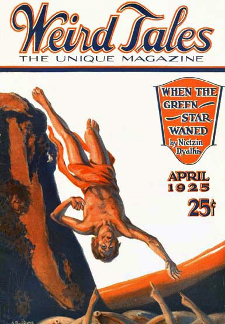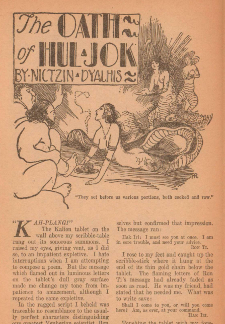Derivative of Nictzin Dyalhis
Writing Another Chronicle of the Venhezian Heroes
Monday, May 4, 2020 10:11 pm
Somehow I became aware of The Sapphire Goddess: The Fantasies of Nictzin Dyalhis, a collection published by DMR Books in 2018. It collects all the fantasy stories of the unprolific Nictzin Dyalhis, who wrote primarily for Weird Tales between 1925 and 1940.
Two of Dyalhis's contributions to Weird Tales are science fiction: When the Green Star Waned (April 1925) and its sequel The Oath of Hul Jok (September 1928).
There's an earnestness to Dyalhis's two stories. They are all superlatives, exclamation points, and outsized drama. The seven friends are the very best of their kind: the greatest scientist, the greatest diplomat, the greatest warrior, the greatest cultural scholar, the greatest biologist, the greatest reader of minds, and the greatest... well, the narrator is not presented as the "greatest" chronicler and poet, but he is part of the amazing circle.
The stories are clearly science fiction written before World War II. There isn't a lot of hard science. Nor is there magic; but there is an easy and intriguing occultism. Evil is as much a force as electricity. The technology has that alluring mechanical flavor, free of the atomic and the cybernetic.
The setting is the Planetary Chain, an alternative Solar System. Maybe it's the far future of our own but it seems much more a different place. The names of the planets are just a little off — Venhez for Venus, Jopitar for Jupiter, and so on. There are invocations of Our Lady of Venhez, a being who is not really Aphrodite. Venhez is a planet of love and its sign is the Looped Cross (i.e., ), but everything is sideways of our reality and mythology.
And that was my first handhold in creating my derivative work. Dyalhis doesn't develop things deeply. The world-building, though neat, is mostly suggestive.
My second handhold was the sketchiness of the characters. Hul Jok the warrior is vivid, Vir Dax the biologist has some color, Lan Apo the mind-reader is not a blank, and Hak Iri the poet, if only because he is our melodramatic narrator, is not one-dimensional, but by and large the characters are just carriers of superpowers. As you revel in Hul Jok you lament the general blandness of the others.
So there is a lot of foundation in the two stories but not a lot of definition. There's also an enjoyable spirit (and the touch of an outlook rather removed from 2020). The past century has not exactly produced a communal literary expansion of Hak Iri's Friends & the Planetary Chain. I may even be a pioneer. In any event, I had cause to continue Dyahlis's work; and therefore I did.
No, I did not write a gritty reboot. I'm not out to subvert expectations. Vir Dax does not have a gruesome past with a missing call-girl and Lan Apo is not struggling as a transgendered pansexual. My story is not a parody or even an affectionately comedic re-imagining. I simply wrote the third in a series.
Obviously I am not Dyalhis. Yet there is a manner to his writing that accords with my own and I don't need to mimic him wholly to evoke him. My goal was not, in any event, to don a Dyalhis mask. My work is truly derivative, neither identical nor separate. It follows well, I think.
Now I just need Cirsova to accept it — so that you can read it! Sadly, even in the best case, it won't be published for a year or more. But keep an eye out for The Impossible Footprint.
P.S. "Nictzin Dyalhis," though nom-de-plumey, was the man's actual name, near as can be determined. And I do recommend the collection from DMR.
P.P.S. The Impossible Footprint was eventually published by Cirsova and is also available in my collection Stellar Stories Vol. 2.
Two of Dyalhis's contributions to Weird Tales are science fiction: When the Green Star Waned (April 1925) and its sequel The Oath of Hul Jok (September 1928).
 |  |
There's an earnestness to Dyalhis's two stories. They are all superlatives, exclamation points, and outsized drama. The seven friends are the very best of their kind: the greatest scientist, the greatest diplomat, the greatest warrior, the greatest cultural scholar, the greatest biologist, the greatest reader of minds, and the greatest... well, the narrator is not presented as the "greatest" chronicler and poet, but he is part of the amazing circle.
The stories are clearly science fiction written before World War II. There isn't a lot of hard science. Nor is there magic; but there is an easy and intriguing occultism. Evil is as much a force as electricity. The technology has that alluring mechanical flavor, free of the atomic and the cybernetic.
The setting is the Planetary Chain, an alternative Solar System. Maybe it's the far future of our own but it seems much more a different place. The names of the planets are just a little off — Venhez for Venus, Jopitar for Jupiter, and so on. There are invocations of Our Lady of Venhez, a being who is not really Aphrodite. Venhez is a planet of love and its sign is the Looped Cross (i.e., ), but everything is sideways of our reality and mythology.
And that was my first handhold in creating my derivative work. Dyalhis doesn't develop things deeply. The world-building, though neat, is mostly suggestive.
My second handhold was the sketchiness of the characters. Hul Jok the warrior is vivid, Vir Dax the biologist has some color, Lan Apo the mind-reader is not a blank, and Hak Iri the poet, if only because he is our melodramatic narrator, is not one-dimensional, but by and large the characters are just carriers of superpowers. As you revel in Hul Jok you lament the general blandness of the others.
So there is a lot of foundation in the two stories but not a lot of definition. There's also an enjoyable spirit (and the touch of an outlook rather removed from 2020). The past century has not exactly produced a communal literary expansion of Hak Iri's Friends & the Planetary Chain. I may even be a pioneer. In any event, I had cause to continue Dyahlis's work; and therefore I did.
No, I did not write a gritty reboot. I'm not out to subvert expectations. Vir Dax does not have a gruesome past with a missing call-girl and Lan Apo is not struggling as a transgendered pansexual. My story is not a parody or even an affectionately comedic re-imagining. I simply wrote the third in a series.
Obviously I am not Dyalhis. Yet there is a manner to his writing that accords with my own and I don't need to mimic him wholly to evoke him. My goal was not, in any event, to don a Dyalhis mask. My work is truly derivative, neither identical nor separate. It follows well, I think.
Now I just need Cirsova to accept it — so that you can read it! Sadly, even in the best case, it won't be published for a year or more. But keep an eye out for The Impossible Footprint.
P.S. "Nictzin Dyalhis," though nom-de-plumey, was the man's actual name, near as can be determined. And I do recommend the collection from DMR.
P.P.S. The Impossible Footprint was eventually published by Cirsova and is also available in my collection Stellar Stories Vol. 2.
© 2004-26 David Skinner · All rights reserved